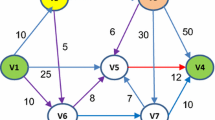Abstract
This paper studies a class of social welfare relations (SWRs) on the set of infinite utility streams. In particular, we examine the SWRs satisfying \({\mathcal{Q}}\)-Anonymity, an impartiality axiom stronger than Finite Anonymity, as well as Strong Pareto and a certain equity axiom. First, we characterize the extension of the generalized Lorenz SWR by combining \({\mathcal{Q}}\)-Anonymity with Strong Pareto and Pigou–Dalton Equity. Second, we replace Pigou–Dalton Equity with Hammond Equity for characterizing the extended leximin SWR. Third, we give an alternative characterization of the extended utilitarian SWR by substituting Incremental Equity for Pigou–Dalton Equity.
Similar content being viewed by others
References
Arrow KJ (1963) Social choice and individual values, 2nd edn. Wiley, New York
Asheim GB, Tungodden B (2004) Resolving distributional conflicts between generations. Econ Theory 24: 221–230
Asheim GB, Tungodden B (2005) Do Koopmans’ postulates lead to discounted utilitarianism? Mimeo, University of Oslo
Asheim GB, Buchholz W, Tungodden B (2001) Justifying sustainability. J Environ Econ Manage 41: 252–268
Banerjee K (2006a) On the extension of the utilitarian and Suppes–Sen social welfare relations to infinite utility streams. Soc Choice Welf 27: 327–339
Banerjee K (2006b) On the equity-efficiency trade off in aggregating infinite utility streams. Econ Lett 93: 63–67
Basu K, Mitra T (2007) Utilitarianism for infinite utility streams: a new welfare criterion and its axiomatic characterization. J Econ Theory 133: 350–373
Blackorby C, Bossert W, Donaldson D (2002) Utilitarianism and the theory of justice. In: Arrow KJ, Sen AK, Suzumura K (eds) Handbook of social choice and welfare, vol I. North-Holland, Amsterdam
Bossert W, Weymark JA (2004) Utility in social choice. In: Barberà S, Hammond P, Seidl C (eds) Handbook of utility theory, extensions, vol 2. Kluwer, Boston
Bossert W, Sprumont Y, Suzumura K (2007) Ordering infinite utility streams. J Econ Theory 135: 579–589
d’Aspremont C (2007) Formal welfarism and intergenerational equity. In: Roemer J, Suzumura K (eds) Intergenerational equity and sustainability. Palgrave, London
d’Aspremont C, Gevers L (2002) Social welfare functionals and interpersonal comparability. In: Arrow KJ, Sen AK, Suzumura K (eds) Handbook of social choice and welfare, vol I. North-Holland, Amsterdam
Dalton H (1920) The measurement of the inequality of incomes. Econ J 30: 348–361
Diamond P (1965) The evaluation of infinite utility streams. Econometrica 33: 170–177
Fleurbaey M, Michel P (2003) Intertemporal equity and the extension of the Ramsey criterion. J Math Econ 39: 777–802
Hammond PJ (1976) Equity, Arrow’s conditions, and Rawls’ difference principle. Econometrica 44: 793–804
Hara C, Shinotsuka T, Suzumura K, Xu Y (2008) Continuity and egalitarianism in the evaluation of infinite utility streams. Soc Choice Welf 31: 179–191
Lauwers L (1997a) Rawlsian equity and generalised utilitarianism with and infinite population. Econ Theory 9: 143–150
Lauwers L (1997b) Infinite utility: insisting on strong monotonicity. Aust J Philos 75: 222–233
Lauwers L (2006) Ordering infinite utility streams: completeness at the cost of a non-Ramsey set. Mimeo, Katholike Universiteit Leuven
Mitra T, Basu K (2007) On the existence of Paretian social welfare quasi-orderings for infinite utility streams with extended anonymity. In: Roemer J, Suzumura K (eds) Intergenerational equity and sustainability. Palgrave, London
Pigou A (1912) Wealth and welfare. Macmillan, London
Sakai T (2003) An axiomatic approach to intergenerational equity. Soc Choice Welf 20: 167–176
Sakai T (2006) Equitable intergenerational preferences on restricted domains. Soc Choice Welf 27: 41–54
Sen AK (1970) Collective choice and social welfare. Holden-Day, Amsterdam
Suppes P (1966) Some formal models of grading principles. Synthese 6: 284–306
Svensson LG (1980) Equity among generations. Econometrica 48: 1251–1256
Szpilrajn E (1930) Sur l’extension de l’ordre partiel. Fundam Math 16: 386–389
van Liedekerke L (1995) Should utilitarians be cautious about an infinite future. Aust J Philos 73: 405–407
Zame W (2007) Can intergenerational equity be operationalized? Theor Econ 2: 187–202
Author information
Authors and Affiliations
Corresponding author
Rights and permissions
About this article
Cite this article
Kamaga, K., Kojima, T. \({\mathcal{Q}}\)-anonymous social welfare relations on infinite utility streams. Soc Choice Welf 33, 405–413 (2009). https://doi.org/10.1007/s00355-009-0366-8
Received:
Accepted:
Published:
Issue Date:
DOI: https://doi.org/10.1007/s00355-009-0366-8



